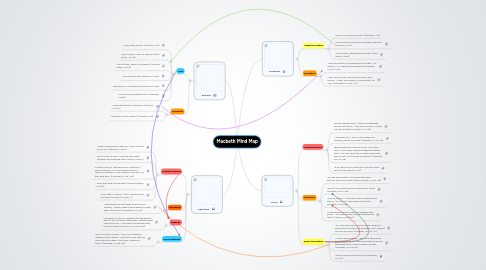
1. Epithets
1.1. Trust
1.1.1. "Hail, brave friend!" (Malcom, I.ii.5)
1.1.2. "Hail to thee, Thane of Glamis!" (First Witch, I.iii.48).
1.1.3. "Hail to thee, Thane of Cawdor!" (Second Witch, I.iii.49).
1.1.4. "My noble partner" (Banquo, I.iii.54)
1.1.5. "The Prince of Cumberland" (Malcom, I.iv.39)
1.1.6. "The Lord's anointed temple" (Macduff, II.iii.60)
1.2. Deception
1.2.1. "The instruments of darkness" (Banquo, I.iii.124)
1.2.2. "mistress of your charms" (Hecate,III.v.6).
2. Light/dark
2.1. Cruelty/violence
2.1.1. "There's husbandry in heaven; / Their candles are all out" (Banquo,II.i.4b-5)
2.1.2. "By th' clock 'tis day, / And yet dark night strangles the traveling lamp" (Ross,II.iv.6b-7).
2.1.3. "Fleance, his son, that keeps him company, / Whose absence is no less material to me / Than is his father's, must embrace the fate / Of that dark hour" (Macbeth,III.i.134-137).
2.1.4. "Who did strike out the light" (Third Murderer, III.iii.18)
2.1.5. "This night I'll spend / Unto a dismal and a fatal end" (Hecate,III.v.20b-21).
2.2. Deception
2.2.1. "Good things of day begin to droop and drowse, / Whiles night's black agents to their preys do rouse" (Macbeth,III.ii.51-52).
2.3. Revenge
2.3.1. "Macbeth / Is ripe for shaking, and the powers above / Put on their instruments. Receive what cheer you man. / The night is long that never finds the day" (Malcolm,IV.iii.240b-243).
2.4. Honor/integrity
2.4.1. "Out, out, brief candle! / Life's but a walking shadow, a poor player / That struts and frets his hour upon the stage / And then is heard no more" (Macbeth,V.v.23b-26).
3. Paradoxes
3.1. Power/corruption
3.1.1. "Fair is foul, and foul is fair" (Witches, I.i.10)
3.1.2. "What he hath lost, noble Macbeth hath won" (Duncan, I.ii.70)
3.1.3. "Lesser than Macbeth and greater" (First Witch, I.iii.65)
3.2. Deception
3.2.1. "The instruments of darkness tell us truths ... to betray 's / In deepest consequence" (Banquo, I.iii.124-126).
3.2.2. "Who can be wise, amazed, temp'rate, and furious, / Loyal, and neutral, in a moment? No man" (Macbeth, II.iii.100-101)
4. Blood
4.1. Cruelty/violence
4.1.1. "his brandished steel, / Which smoked with bloody execution, / Like valor's minion, carved out his passage" (Captain, I.ii.17-19)
4.1.2. "I see thee still, / And, on thy blade and dudgeon, gouts of blood" (Macbeth, II.i.44-45).
4.1.3. "Blood hath been shed ere now, i' th' olden time, / Ere human statute purged the gentle weal; / Ay, and since too, murders have been performed / Too terrible for the ear" (Macbeth, III.iv.75-78).
4.1.4. "It will have blood, they say; blood will have blood" (Macbeth,III.iv.122).
4.2. Deception
4.2.1. "Go get some water / And wash this filthy witness from your hand" (Lady Macbeth, II.ii.44-45)
4.2.2. "smear / The sleepy grooms with blood" (Lady Macbeth, II.ii.47-48)
4.2.3. "If he do bleed, / I'll gild the faces of the grooms withal, / For it must seem their guilt (Lady Macbeth, II.ii.53-55)
4.2.4. "Their hands and faces were all badged with blood. ... No man's life was to be trusted with them" (Lennox, II.iii.94,97)
4.3. Power/corruption
4.3.1. "So is he mine, and in such bloody distance / That every minute of his being thrusts / Against my near'st of life" (Macbeth, III.i.115-117)
4.3.2. "Come, seeling night, ... And with thy bloody and invisible hand / Cancel and tear to pieces that great bond / Which keeps me pale" (Macbeth, III.ii.45-49)
4.3.3. "There's blood upon thy face" (Macbeth, III.iv.12)
